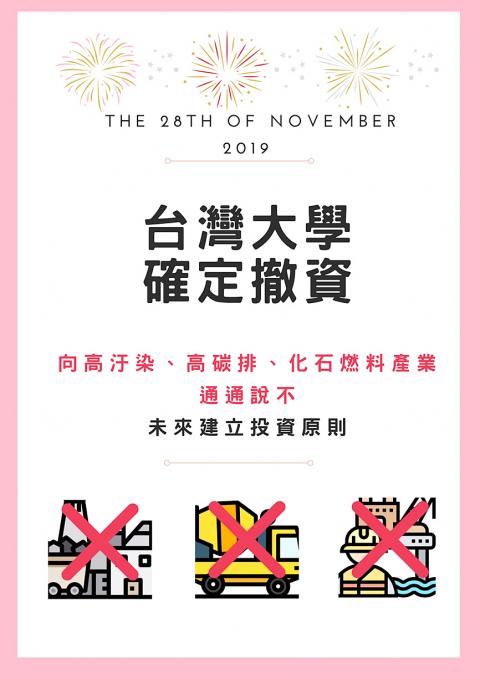National Taiwan University (NTU) plans to divest NT$432 million (US$14.3 million) from six “high pollution” and “high carbon emission” companies by the end of next year, the university’s Student Association said.
NTU’s chief financial officer (CFO) told the student group that the school has targeted six companies, accounting for 22 percent of the university’s investments, and has already divested from four of them, NTU Student Association head of sustainability Huang Yu-ting (黃毓庭) said.
Divestment from the remaining companies is expected to be completed by the end of next year, she said, adding that the university did not publicly reveal the names of the companies.

Photo taken from the National Taiwan University Student Association Department of Sustainability Facebook page
The association said that it had previously asked university presidential candidates whether they would divest the school’s fund from “high pollution, high carbon emission” companies, and NTU president Kuan Chung-ming (管中閔), then a candidate, promised he would.
On Nov. 28, the association received details on the divestment from the CFO, who told them that starting in mid-September, the university had begun the divestment process, Huang said.
Although the university’s divestment is “the first in Asia,” more than 150 universities around the world are already doing the same, she said.
International groups that track divestments would base their observations on public and official commitments made by the university, she said, urging NTU to make a public announcement.
She said that NTU should set guidelines for future investments and that it consider not just profit, but also environmental risks.
In the past, the university has invested in companies with the top 12 highest levels of greenhouse gas emissions in Taiwan, Huang said.
She said she believes that input from university professors could help it establish better investment parameters.
Investments by NTU’s fund in China Steel Corp, Asia Cement Corp, Taiwan Cement Corp, Formosa Plastics Group and other companies total about NT$260 million, the student associations’ data showed.

Taiwanese can file complaints with the Tourism Administration to report travel agencies if their activities caused termination of a person’s citizenship, Mainland Affairs Council Minister Chiu Chui-cheng (邱垂正) said yesterday, after a podcaster highlighted a case in which a person’s citizenship was canceled for receiving a single-use Chinese passport to enter Russia. The council is aware of incidents in which people who signed up through Chinese travel agencies for tours of Russia were told they could obtain Russian visas and fast-track border clearance, Chiu told reporters on the sidelines of an event in Taipei. However, the travel agencies actually applied

Japanese footwear brand Onitsuka Tiger today issued a public apology and said it has suspended an employee amid allegations that the staff member discriminated against a Vietnamese customer at its Taipei 101 store. Posting on the social media platform Threads yesterday, a user said that an employee at the store said that “those shoes are very expensive” when her friend, who is a migrant worker from Vietnam, asked for assistance. The employee then ignored her until she asked again, to which she replied: "We don't have a size 37." The post had amassed nearly 26,000 likes and 916 comments as of this

New measures aimed at making Taiwan more attractive to foreign professionals came into effect this month, the National Development Council said yesterday. Among the changes, international students at Taiwanese universities would be able to work in Taiwan without a work permit in the two years after they graduate, explainer materials provided by the council said. In addition, foreign nationals who graduated from one of the world’s top 200 universities within the past five years can also apply for a two-year open work permit. Previously, those graduates would have needed to apply for a work permit using point-based criteria or have a Taiwanese company

The Shilin District Prosecutors’ Office yesterday indicted two Taiwanese and issued a wanted notice for Pete Liu (劉作虎), founder of Shenzhen-based smartphone manufacturer OnePlus Technology Co (萬普拉斯科技), for allegedly contravening the Act Governing Relations Between the People of the Taiwan Area and the Mainland Area (臺灣地區與大陸地區人民關係條例) by poaching 70 engineers in Taiwan. Liu allegedly traveled to Taiwan at the end of 2014 and met with a Taiwanese man surnamed Lin (林) to discuss establishing a mobile software research and development (R&D) team in Taiwan, prosecutors said. Without approval from the government, Lin, following Liu’s instructions, recruited more than 70 software